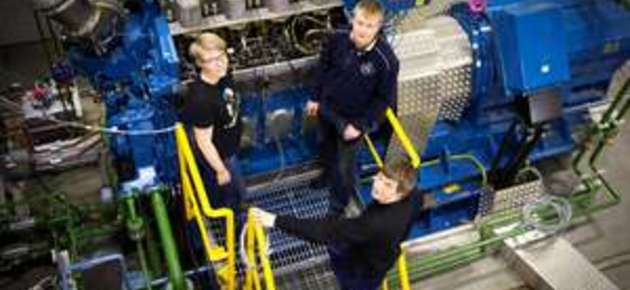VEBIC's engine laboratory starts operating


The new engine hall features a 4L20 diesel engine, typically used in ships, provided by Wärtsilä, a global leader in smart technologies and complete lifecycle solutions for the marine and energy markets.
Tests related to the international HERCULES-2 research project have been started on the 4L20 engine. The project, funded partly by the EU program Horizon 2020, is aimed at developing engines' fuel flexibility, achieving significant emission reductions to reach near-zero emissions, and improving engine control and parameter systems.
"We will install a new control system to the engine. It will enable significant improvements to the parameters and control of the engine," says Seppo Niemi, professor of Energy Technology at the University of Vaasa.
The main objective is to increase the number of possible fuel types for the engine. The tests include fossil, renewable and recycled fuels. Niemi and his research team measure things such as the ignition properties of fuels and track the combustion processes.
"We look at what kinds of mixtures we can run and what the engine's fuel system should be like in order to enable flexible fuel use."
HERCULES-2 is a joint project by the two major European engine manufacturers, Wärtsilä and MAN Diesel & Turbo. It also involves other businesses, such as Dinex Ecocat, as well as several universities and research institutions, including the University of Vaasa. The EU has granted the entire project a total of EUR 16.8 million, of which EUR 1.45 million are allocated to the University of Vaasa.
“VEBIC is an important part of Wärtsilä’s collaboration with four Finnish universities in the Engine Research Initiative programme. The test laboratory is unique and enables demonstration of cutting-edge technologies for a sustainable future”, says Christer Wik, Laboratory Manager at Wärtsilä Marine Solutions.
According to professor Seppo Niemi, the objective is to get another big engine to the laboratory next year and a smaller engine possible already this year.
The VEBIC fuel laboratory has already been operating for a year. It works in close collaboration with the engine laboratory and has supported the research in the HERCULES-2 project.
Further information:
Seppo Niemi, Professor in Energy Technology, University of Vaasa, tel. +358 29 449 8304, email: seppo.niemi(at)uwasa.fi